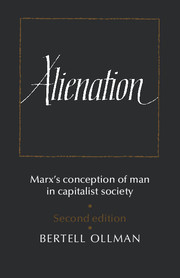Book contents
- Frontmatter
- Contents
- Preface to the second edition
- Note on translations
- Acknowledgements
- General introduction
- PART I PHILOSOPHICAL INTRODUCTION
- PART II MARX'S CONCEPTION OF HUMAN NATURE
- PART III THE THEORY OF ALIENATION
- 18 The theory of alienation
- 19 Man's relation to his productive activity
- 20 Man's relation to his product
- 21 Man's relation to his fellow men
- 22 Man's relation to his species
- 23 The capitalist's alienation
- 24 The division of labor and private property
- 25 The labor theory of value: labor-power
- 26 Value as alienated labor
- 27 The metamorphosis of value
- 28 The fetishism of commodities
- 29 Class as a value Relation
- 30 State as a value Relation
- 31 Religion as a value Relation
- 32 Marx's critique of bourgeois ideology
- PART IV CONCLUSION
- Appendix I In defense of the philosophy of internal relations
- Appendix II Response to my critics: more on internal relations
- Notes to the text
- Bibliography of works cited
- Index of names and ideas
- Cambridge Studies in the History and Theory of Politics
19 - Man's relation to his productive activity
Published online by Cambridge University Press: 05 June 2012
- Frontmatter
- Contents
- Preface to the second edition
- Note on translations
- Acknowledgements
- General introduction
- PART I PHILOSOPHICAL INTRODUCTION
- PART II MARX'S CONCEPTION OF HUMAN NATURE
- PART III THE THEORY OF ALIENATION
- 18 The theory of alienation
- 19 Man's relation to his productive activity
- 20 Man's relation to his product
- 21 Man's relation to his fellow men
- 22 Man's relation to his species
- 23 The capitalist's alienation
- 24 The division of labor and private property
- 25 The labor theory of value: labor-power
- 26 Value as alienated labor
- 27 The metamorphosis of value
- 28 The fetishism of commodities
- 29 Class as a value Relation
- 30 State as a value Relation
- 31 Religion as a value Relation
- 32 Marx's critique of bourgeois ideology
- PART IV CONCLUSION
- Appendix I In defense of the philosophy of internal relations
- Appendix II Response to my critics: more on internal relations
- Notes to the text
- Bibliography of works cited
- Index of names and ideas
- Cambridge Studies in the History and Theory of Politics
Summary
In his only organized treatment of the subject, Marx presents alienation as partaking of four broad relations which are so distributed as to cover the whole of human existence. These are man's relations to his productive activity, his product, other men and the species. Productive activity in capitalism is spoken of as ‘active alienation, the alienation of activity, the activity of alienation’. Asking ‘What, then, constitutes the alienation of labor?’, Marx offers the following reply:
First, the fact that labor is external to the worker, i.e., it does not belong to his essential being; that in his work, therefore, he does not affirm himself but denies himself, does not feel content but unhappy, does not develop freely his physical and mental energy but mortifies his body and Tuins his mind. The worker therefore only feels himself outside his work, and in his work feels outside himself. He is at home when he is not working, and when he is working he is not at home. His labor is therefore not voluntary, but coerced; it's forced labor. It is therefore not the satisfaction of a need; it is merely a means to satisfy needs external to it.
In claiming that labor does not belong to man's essential being, that in it he denies rather than affirms himself and that it is not a satisfaction of a need but merely satisfies needs external to it, Marx's point of reference is species man.
Information
- Type
- Chapter
- Information
- AlienationMarx's Conception of Man in a Capitalist Society, pp. 136 - 140Publisher: Cambridge University PressPrint publication year: 1977
